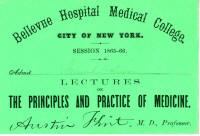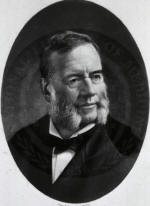Austin Flint,
Sr. M.D.

 Austin Flint, M.D.
Born in Petersham, Massachusetts and gained his MD at Harvard. His medical
teaching career included spells at the University of Louisville and New
Orleans Medical College. He helped found Bellevue Medical College in New
York City, and taught there and at Long Island College Hospital for many
years. He wrote numerous textbooks, of which Treatise on the Principles
and Practice of Medicine (1866, with many revised editions) was the best
known. Austin Flint, M.D.
Born in Petersham, Massachusetts and gained his MD at Harvard. His medical
teaching career included spells at the University of Louisville and New
Orleans Medical College. He helped found Bellevue Medical College in New
York City, and taught there and at Long Island College Hospital for many
years. He wrote numerous textbooks, of which Treatise on the Principles
and Practice of Medicine (1866, with many revised editions) was the best
known.
He practiced and taught
medicine in Boston and Buffalo, New York. He then taught hospital medicine
at various medical schools, becoming an authority on pulmonary and
respiratory diseases, and popularizing the use of the binaural stethoscope.
From
1868 until his death in 1886, he served as Professor of Principles and
Practice of Internal Medicine and the first Chairman of the Department of
Medicine at Bellevue Hospital Medical College, from which NYU School of
Medicine had its origins. Among his many accomplishments, Dr. Flint is
credited with the original descriptions of abnormal breath sounds. Two signs
are familiarly identified with his name: Flint's Law and the Austin Flint
murmur.
FLINT, Austin, physician, born in
Petersham, Massachusetts, 20 October 1812; died in New York City, 13
March 1886. He studied at Amherst and Harvard, and was graduated at the
medical department of the latter institution in 1833. His professional
career began in Northampton, and was continued in Boston until 1836,
when he removed to Buffalo, and remained there till 1844. He then
accepted a call to the chair of the institutes and practice of medicine
at the Rush medical College in Chicago, but a year later returned to
Buffalo. In 1846 he established the "Buffalo Medical Journal," which he
subsequently conducted until 1856.
In connection with Dr. James P. White
and Dr. Frank H. Hamilton, he founded, in 1847, the Buffalo medical
College, in which, for six years, he was professor of the principles and
practice of medicine, and clinical medicine. In 1852 he was called to
fill a similar chair in the Louisville University, but in 1856 returned
to Buffalo and became professor of pathology and clinical medicine. From
1858 till 1861 he spent the winters in New Orleans as professor of
clinical medicine in the school of medicine there, and visiting
physician to the Charity hospital. In 1859 he removed to New York, and
two years later was appointed professor of pathology and practical
medicine in the Long Island College hospital, in which relation he
continued until 1868. At the same time he became professor of the
principles and practice of medicine in the Bellevue hospital medical
College, and also visiting physician to the hospital itself. These
offices he held until his death.
Dr. Flint was also consulting
physician to the Charity hospital, to the Hospital for the ruptured and
crippled, to St. Mary's hospital, and to St. Elizabeth's hospital. In
1872 he was elected president of the New York academy of medicine, and
held that office until 1885, when he resigned, on the adoption of the
medical code sanctioning consultations with physicians of other than the
"regular" school, and he was president of the American medical
association in 1884. Besides being a corresponding member of numerous
medical societies abroad, he was connected with many American medical
and scientific bodies, and his name was on the rolls of the County and
state medical associations from the time they were organized. In 1876 he
was a delegate to the International medical congress which ,net in
Philadelphia, and delivered an address on "Medicine." He attended the
medical congresses held in London in 1881 and in Copenhagen in 1884, and
had been elected to preside at the congress to be held in Washington in
1887. His contributions to medical literature were very large, and his
essays "On the Variations of Pitch in Percussion and Respiratory Sounds
" and " On the Clinical Study of the Heart Sounds in Health and Disease"
received the first prizes of the American medical association in 1852
and 1859. His larger works include " Clinical Reports on Continued
Fever" (Buffalo, 1852); "Clinical Report on Chronic Pleurisy" (1853);
"Clinical Report on Dysentery" (1853); "Physical Exploration and
Diagnosis of Diseases affecting the Respiratory Organs " (Philadelphia,
185(;; 3d ed., 1868); " Practical Treatise on Diseases of the Heart"
(1859; 2d ed., 1870); "Treatise on the Principles and Practice of
Medicine," of which more than 40,000 copies have been sold (1866; 5th
ed., 1881); " Contributions Relating to Camp Diseases" (New York, 1867);
"Essays on Conservative Medicine and Kindred Topics " (Philadelphia,
1874); "Phthisis, its Morbid Anatomy, Etiology, Syruptomatic Events and
Complications, Fatality and Prognosis, Treatment and Physical Diagnosis"
(1875); "Manual of Auscultation and Percussion" (1876);" Clinical
Medicine, a Systematic Treatise on the Diagnosis and Treatment of
Diseases" (1879);" Physical Exploration of the Lungs by Means of
Auscultation and Percussion" (1882); and "Medical Ethics and Etiquette"
(New York, 1883).
______________
From Bellevue Hospital:
1861
Flint,* Austin, 1886.
M. D., Harvard, 1833; LL. D.,
Louisville (Ky.), & Yale (hon.), 1881; founder "Buffalo Med. Jour.,"
and editor 1846-56; a founder Buffalo Med. Coll., 1846; Prof. Theor.
& Pract. Med. & Clin. Med. & of Pathol., 1846-52, and again in
1856-58; Theor. and Pract. Med., Univ. Louisville (Ky.), 1852-56;
Clin. Med., Univ. Louisiana, 1858-61; Prin. & Pract. Med., Bell.
Hosp. Med. Coll., 1861-86; Vis. Phys., Charity Hosp., New Orleans,
1858-61 ; Prof. Path. & Pract. Med., L. I. Coll. Hosp., 1861; Pres.
N. Y. Acad. Med., 1873-75; Amer. Med. Assoc., 1883-84. Author of
Prize Essay, " The Variation of Pitch in Percussion & Respiratory
Sounds," 1852, and of " The Clinical Study of the Heart Sounds in
Health & Disease," 1859, and of the following books: "Continued
Fever," Buffalo, 1852; "Report on Dysentery," Buffalo, 1853; "
Diseases of the Respiratory Organs," Phila., 1856; " Treatise on the
Principles and Practice of Medicine." (1st ed., xvi., 867 pp., 8°,
Phila.,H. C. Lea, 1866; 2d ed., xvi., 967 pp., 8°, 1867; 3ded., 1002
pp., 8°, 1868; 4th ed., xvi., 1070 pp., 8°, 1873; 5ih
ed., xvi., 1150 pp., 8°, 1881 ; 6th ed., 1160 pp., 8°, 1886);
"Diseases of the Heart," Phila., 1870; "Heart Sounds,"
Phila., 1870; "Conservative Medicine," Phila., 1874; "Phthisis,"
Phila., 1875; "Clinical Medicine," Phila.,
1879; "Physical Exploration of the Lungs," Phila., 1882; " Medical
Ethics and Etiquette," New-York, 1883 ; " Man-
ual of Auscultation and Percussion," Phila., 1885. Died in N. Y.
City, 1886, aet. 74; cause, cerebral hemorrhage.
Father of Austin Flint, 2d (1869-74), and grandfather of Austin
Flint, 3d (1890, II).
|
|